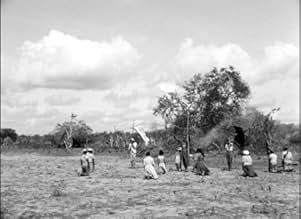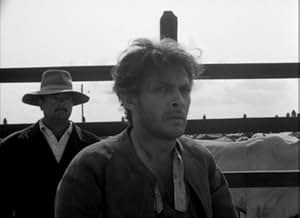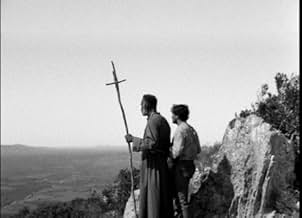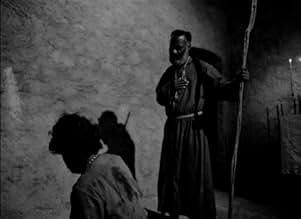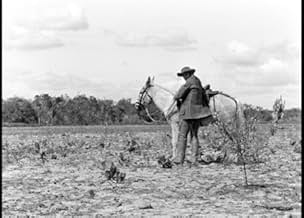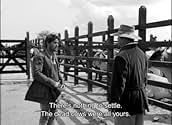NOTE IMDb
7,2/10
5,9 k
MA NOTE
Ajouter une intrigue dans votre langueAfter killing his employer when he tries to cheat him out of his payment, a man becomes an outlaw and starts following a self-proclaimed saint.After killing his employer when he tries to cheat him out of his payment, a man becomes an outlaw and starts following a self-proclaimed saint.After killing his employer when he tries to cheat him out of his payment, a man becomes an outlaw and starts following a self-proclaimed saint.
- Réalisation
- Scénario
- Casting principal
- Récompenses
- 1 nomination au total
Milton Rosa
- Moraes
- (as Milton Roda)
Marrom
- Cego Júlio
- (non crédité)
Avis à la une
This movie is so fantastic! I've seen it like 10 times or so, and I still get impressed whenever I watch it. Glauber Rocha, who was a total genius, unites various elements of Brazil's Northeastern culture in a great story about alienation of the people. The story is narrated by a singer who impersonates a regional popular singer; and the visual aspects of the film and the tone of black and white are supposed to resemble the rhymes and the woodcut covers which invoke the "literatura de cordel", or "string literature", which is very common in the northeast of Brazil(not so much today, but certainly in the 60's). The film shows how the powerful control the poorest through violence and intimidation, and how religion and the "Cangaço" movement can be bad when a person without perspective and objectives in life get involved with them. Manuel, the main character, is totally alienated by the "black god" Sebastião, which resembles, in many ways, real Brazilian preacher Antônio Conselheiro; and by the "white devil" Corisco(a real Cangaceiro who worked with real and, in the 20's and 30's, widely famous Cangaço boss Lampião), wonderfully performed by Othon Bastos, while the hired gun Antonio das Mortes is on the look for both Sebastião and Corisco through the badlands of Northeast. This is a real masterpiece!!
I saw this film on the premise of that it according to critics is the "best Brazilian film of all times". Critics are way too generous to this young auteur influenced by Eisenstein and other masters, mixing genres and styles but only achieving an amateurish, confused, pretentious and quite tasteless work. It is messy, low-budget and is overall not worth watching despite a handful of nice shots and moments. In an accompanying interview to the film, the director Rocha, with Marxist rhetoric, blame European colonists for Latin America's economic problems and justifies the movie's content as "the aesthetics of hunger". To me, more than anything else, it shows the madness of religion and cults and how they attract people in desperation.
Like Karl Marx's Communist Manifesto, Deus e O Diabo Na Terra Do Sol, (translated: God and the Devil in Land of Sun) doesn't bother mincing words when addressing what's wrong with the world. As Communism swept through South America and Cuba in the 50's and 60's, Socialist film-making enjoyed its greatest hey dey and, amongst those films, DeODNTDS is remembered as one of the best. Whereas films like Mikhail Kalatozov's I Am Cuba were unabashed agents of propaganda, bashing Capitalism with a hammer-like heavy hand, Glauber Rocha's efforts were hidden behind the symbolism of one man's Chaucer-esque journey into an unknown fate.
The journey is Manuel's, an impoverished farmer who is radicalized after killing his boss who (like evil capitalists do) attempted to cheat Manuel of his wages. Manuel then finds God, in the form of a self-proclaimed Saint named Sebastian. Before long, Sebastian's blood thirsty spell over Manuel is broken by Rosa, Manuel's dutiful (and long-suffering) wife. But soon after they're free from Sebastian's grip, Manuel is seduced by the charms of a charismatic and similarly blood thirsty bandit named Corisco. Such is the way with Manuel, doomed to follow, and it is this theme that strangles the life out of Rocha's film.
DeODNTDS is a scathing indictment of not only capitalism, but also of religion and society as a whole. In this world, man is desperately out of balance with nature (and thus himself), wishing (and prophesying) for the land to turn to sea and the sea to turn to land. These fruitless dreams are a constant reminder that man must look inward, to find strength from his own heart and hands. The message is unmistakable, as stark as the black and white imagery Rocha bombards us with, but the trouble with DeODNTDS is that it makes it's point early on is compelled to repeat it over and over again, not unlike a mantra.The inevitable fate of Manuel is set up mid-way through the first act, when bounty hunter Antonio das Mortes is hired by church and city officials to kill Saint Sebastian and put an end to his proletariat uprising (which threatens the establishment aka the money making machine). But das Mortes' hunt is sidetracked and ultimately stalled to such a degree that by the time he and Manuel come face to face, no real stakes remain. In the process of pitting these two against one another, Rocha's film gets bogged down in dogmatic digressions that drag out for what feels like an eternity. By the time the credits roll, the momentum of the powerful first act is lost, and instead of challenging its audience's socio-political allegiances, Deus eO Diablo Na Terra Do Sol merely challenges you to stay awake.
The journey is Manuel's, an impoverished farmer who is radicalized after killing his boss who (like evil capitalists do) attempted to cheat Manuel of his wages. Manuel then finds God, in the form of a self-proclaimed Saint named Sebastian. Before long, Sebastian's blood thirsty spell over Manuel is broken by Rosa, Manuel's dutiful (and long-suffering) wife. But soon after they're free from Sebastian's grip, Manuel is seduced by the charms of a charismatic and similarly blood thirsty bandit named Corisco. Such is the way with Manuel, doomed to follow, and it is this theme that strangles the life out of Rocha's film.
DeODNTDS is a scathing indictment of not only capitalism, but also of religion and society as a whole. In this world, man is desperately out of balance with nature (and thus himself), wishing (and prophesying) for the land to turn to sea and the sea to turn to land. These fruitless dreams are a constant reminder that man must look inward, to find strength from his own heart and hands. The message is unmistakable, as stark as the black and white imagery Rocha bombards us with, but the trouble with DeODNTDS is that it makes it's point early on is compelled to repeat it over and over again, not unlike a mantra.The inevitable fate of Manuel is set up mid-way through the first act, when bounty hunter Antonio das Mortes is hired by church and city officials to kill Saint Sebastian and put an end to his proletariat uprising (which threatens the establishment aka the money making machine). But das Mortes' hunt is sidetracked and ultimately stalled to such a degree that by the time he and Manuel come face to face, no real stakes remain. In the process of pitting these two against one another, Rocha's film gets bogged down in dogmatic digressions that drag out for what feels like an eternity. By the time the credits roll, the momentum of the powerful first act is lost, and instead of challenging its audience's socio-political allegiances, Deus eO Diablo Na Terra Do Sol merely challenges you to stay awake.
This film begins wonderfully, brilliantly shot and keenly acted- but right as you're sure it's coming to a close, the music suddenly runs uptempo and the narrator says the equivalent of "Wait, there's more!" and the second segment of the film destroys any credibility the first might have established. The director's portrayal of the desert's harshness lends logically to the lunacy of the characters- but Rosa's actions in the second half seem completely unmotivated, as if the actors ran out of script and just start making things up out of boredom in front of the camera. Laudable attempts at Eisenstein-style multiple-repeat editing are a good idea but using them to cover the low-budget nature of the action scenes is not. Overall worth seeing, but I must warn you that I fell asleep towards the end.
I loved the first two-thirds of this jaw-dropping epic. For my second viewing, this time with a friend, we both agreed that it fell to pieces after that point, becoming incoherent and unfathomable, whilst still being stylish and remaining 'strange'.
The visual sense was part 'Aguirre, Wrath of God' and Sergio Leone's 'Once Upon a Time in the West'. But, in grainy, high contrast black & white. Camera movements are urgent rather than flowing with the odd editing flourish to enliven the action. We both found this approach initially utterly mesmerising.
This film is of hardcore fanaticism, with religious bigotry and the sheer survival in the harsh scrub desert-lands of northern Brazil. Some scenes are reminiscent of Russian cinematic masterpieces by Eisentstein, as in Ivan the Terrible. I think some scenes will offend and appal many viewers whilst still retaining mystery and that 'Wow, this is something totally different and exciting'. The sort of film that has the critics swooning but with the actual film-lover rather less than overawed.
I'd rather not go into all the narrative in and outs, mostly because it is the overall effect and impression that it has left on me. Unforgettable, true; daring and significant, undoubtedly. But that doesn't make it a film any easier to watch, though. I would give the first two thirds 9/10 and the remainder five.
The visual sense was part 'Aguirre, Wrath of God' and Sergio Leone's 'Once Upon a Time in the West'. But, in grainy, high contrast black & white. Camera movements are urgent rather than flowing with the odd editing flourish to enliven the action. We both found this approach initially utterly mesmerising.
This film is of hardcore fanaticism, with religious bigotry and the sheer survival in the harsh scrub desert-lands of northern Brazil. Some scenes are reminiscent of Russian cinematic masterpieces by Eisentstein, as in Ivan the Terrible. I think some scenes will offend and appal many viewers whilst still retaining mystery and that 'Wow, this is something totally different and exciting'. The sort of film that has the critics swooning but with the actual film-lover rather less than overawed.
I'd rather not go into all the narrative in and outs, mostly because it is the overall effect and impression that it has left on me. Unforgettable, true; daring and significant, undoubtedly. But that doesn't make it a film any easier to watch, though. I would give the first two thirds 9/10 and the remainder five.
Le saviez-vous
- AnecdotesIn the scene where we see Manuel (Geraldo Del Rey) carrying a huge stone over his head while climbing Monte Santo on his knees, Del Rey insisted on carrying a real stone that weighted over 20 kilos - something that really worried director Glauber Rocha. After the shooting, Del Rey had to take 2 days off, as he wasn't in condition to show up.
- ConnexionsEdited into A Edição do Nordeste (2023)
- Bandes originalesManuel e Rosa
Written by Glauber Rocha & Sérgio Ricardo
Meilleurs choix
Connectez-vous pour évaluer et suivre la liste de favoris afin de recevoir des recommandations personnalisées
- How long is Black God, White Devil?Alimenté par Alexa
Détails
- Date de sortie
- Pays d’origine
- Site officiel
- Langue
- Aussi connu sous le nom de
- Black God, White Devil
- Lieux de tournage
- Sociétés de production
- Voir plus de crédits d'entreprise sur IMDbPro
Box-office
- Montant brut aux États-Unis et au Canada
- 7 826 $US
- Week-end de sortie aux États-Unis et au Canada
- 3 200 $US
- 19 nov. 2023
- Montant brut mondial
- 7 826 $US
- Durée2 heures
- Couleur
- Mixage
- Rapport de forme
- 1.37 : 1
Contribuer à cette page
Suggérer une modification ou ajouter du contenu manquant

Lacune principale
What is the French language plot outline for Le Dieu noir et le diable blond (1964)?
Répondre

